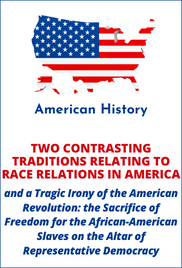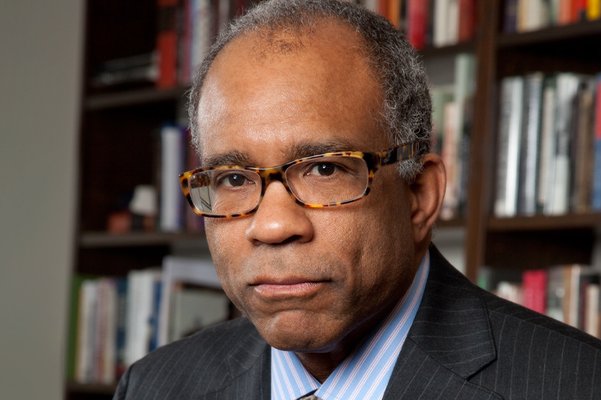Knowing that most Southerners demanded that slavery continue, Washington was unwilling to sacrifice his first love, the American Revolution and the world’s first modern representative government, in order to abolish slavery. In addition, Washington benefitted financially from slavery. He was unwilling to reduce his style of living and that of Martha Washington by freeing the slaves on his plantations while he was alive.
With an eye on the judgment of posterity, in his will, Washington required that upon the death of his wife, the slaves over which he exercised dominion would be freed. He also set up a trust fund to assist in their adjustment to life free of bondage.
Thus, Washington, knowing the arguments against slavery, for his entire adult life committed what is today considered to be a monstrous crime.
Note that there were a few, a very few, of the Founders who were not reconciled to the continuation of slavery. Benjamin Franklin, second only to Washington in stature among the colonists, who secured the intervention of France in the Revolutionary War, and who was instrumental in securing the compromises that allowed the Constitutional Convention to succeed, had owned a slave as a young man. He also printed advertisements for slave auctions in his newspaper, the Pennsylvania Gazette. However, Franklin turned against slavery toward the end of his life. After the adoption of the Constitution, he petitioned Congress to “devise means for removing the Inconsistency [of slavery] from the Character of the American People,” and to “promote mercy and justice toward this distressed Race.” He also wrote anti-slavery essays and became President of the Pennsylvania Society for Promoting the Abolition of Slavery. And, there was Alexander Hamilton who opposed slavery, but like all the Founding Fathers, went along with “the dirty bargain,” “the bargain with the Devil,” of allowing the Southern states to maintain slavery and placing protections for slavery into the Constitution.
Thomas Jefferson, the man who wrote the immortal credo of the American Revolution which has inspired men and women all over the world, “We hold these truths to be self-evident, that all men are created equal, that they are endowed by their Creator with certain unalienable Rights, that among these are Life, Liberty and the pursuit of Happiness,” owned some 600 slaves during his lifetime. This is a stunning indictment. However, it should also be noted that legitimated by the success of the American Revolution and the Constitution, the words written by Thomas Jefferson in the Declaration of Independence have been a tremendous force for good in the world.
It is also worthy of note that nine of the eleven succeeding presidents: Jefferson, Madison, Monroe, Jackson, Van Buren, Harrison, Tyler, Polk and Taylor, owned slaves.
So, how do we judge George Washington, Jefferson, and the Founding Fathers in light of their actions in protecting the curse of slavery and in condoning all of the evil that slavery entails? The answer, as Professor Kennedy says, is complicated. People are creatures of their times. The same personality can incorporate both good and evil. The Founding Fathers were advanced thinkers when it came to understanding that democratic representative government was the proper way to rule a county; they were not advanced, and, in fact, behind Great Britain, with respect to slavery. The Founders should be honored for the immense good that they did for America and for all of humanity in promoting the ideals of liberty and equality, in challenging the legitimacy of royal rule, and in establishing the first republican government of the modern era. However, we should acknowledge their failings, chief among them the acceptance of slavery. So, all of our admiration and thanks to George Washington, Thomas Jefferson and the other Southern Founding Fathers is tempered by the knowledge that they profited from slavery. And for all of the Founding Fathers, our respect is tempered by the realization that they agreed to protect slavery and sacrifice the freedom of millions of people for the purpose of creating the United States.
America’s system of slavery was race-based and spawned prejudice against African Americans. This led to 100 years of Jim Crow after the 13th Amendment and, in some parts of society, racial prejudice ever since. Thus, today, even more than 150 years after Emancipation, due in large part to the sacrifice imposed on the slaves to ensure Southern participation in the Revolution and Southern support for the Constitution, some of our fellow Americans still suffer from the compromise that kept their ancestors in chains for an additional 80 years.
A List of Famous Slave Revolts
Here is a list of some of the more famous slave revolts: Gabriel’s Rebellion of 1800; the 1733 St. John Insurrection, Denmark Vesey’s Revolt; Nat Turner’s Rebellion; the Baptist War (Samuel Sharpe); the Zanj Rebellion; the Haitian Rebellion (Toussaint Louverture); Gaspar Yagna’s Rebellion; the Stono Rebellion; the 1811 German Coast Uprising; the New York Conspiracy of 1741; Gabriel’s Conspiracy of 1800; the Gloucester County Conspiracy (also known as the Servants’ Plot or Birkenhead’s Rebellion); and the New York Slave Revolt of 1712.
African Americans Who Have Made Notable Contributions to American Society
These lists are not complete. Nor are they in any order of priority.
African-American Abolitionists: Frederick Douglass, Sojourner Truth, David Walker, Harriet Tubman, Richard Allen, John Brown Russwurm, James Forten, Prince Hall, Henry Highland Garnet, and Martin R. Delany.
Civil Rights Movement Leaders: Martin Luther King, Jr., Jesse Jackson, Thurgood Marshall, James Lawson; Megdar Evers, Bryan Stevenson, Rosa Parks, A. Philip Randolph, Roy Wilkins, Fannie Lou Hamer, Mary Church Terrell, Walter F. White, Dorothy Height, Charles Hamilton Houston, and James Weldon Johnson. (White Leaders with an impact on the African-American Community: Abraham Lincoln, Lyndon Johnson, Ulysses S. Grant, John Quincy Adams, Benjamin Franklin, Schuyler Colfax Jr., and Thaddeus Stevens.)
Other Accomplished African Americans: Barak Obama (President, community organizer, 1961 – ), Kamala Harris (Vice-President, 1964 – ); Condoleezza Rice (Secretary of State, 1954 – ), Lloyd J. Austin III (general and Secretary of Defense, 1953 – ), Colin Powell (general and Secretary of State, 1937 – 2021), Ketanji Brown Jackson (Supreme Court Associate Justice, 1970 – ), Clarence Thomas (Supreme Court Associate Justice, 1948 – ), Vivien Thomas (surgeon, 1910-1985), The Three Lady Computers at NASA (Dorothy Vaughan, Katherine Goble Johnson, and Mary Jackson); Hank Aaron (athlete: 1934-2021), Ira Aldridge (actor, 1807-1867), Muhammad Ali (boxer, 1942-2016), Marian Anderson (entertainer, 1897-1993), Maya Angelou (poet, 1928-2014), Arthur Ashe (athlete, 1943-1993), James Baldwin (writer, 1924-1987), Benjamin Banneker (mathematician and astronomer, 1731-1806), Amiri Baraka (writer, previously known as LeRoi Jones and Imamu Amear Baraka, 1934-2014), Romare Bearden (visual artist, 1911-1988), Mary McLeod Bethune (educator, philanthropist, humanitarian, feminist and civil rights activist, 1875-1955), Guion Bluford (aerospace engineer, astronaut,1942 – ), Arna Bontemps (poet, 1902-1973), Edward W. Brooke (politician, 1919-2015), Gwendolyn Brooks (poet, 1917-2000), Blanche K. Bruce (politician, plantation owner, 1841-1898), Ralph Bunche (diplomat, 1903-1971), George Washington Carver (scientist, inventor, educator, 1864-1943) Shirley Chisholm (politician, 1924-2005), Kenneth B. Clark (educator, psychologist, 1914-2005), John Henrik Clarke (historian, educator, 1915-1998), John Coltrane (saxophonist, composer, 1926-1967), Alexander Crummell (minister, academic and African nationalist, 1819-1898), Countee Cullen (poet, novelist, children’s writer, playwright 1903-1946), Benjamin O. Davis, Jr. (general, 1912-2002), Charles Drew (surgeon1904-1950), W. E. B. Du Bois (sociologist, historian, 1868-1963), Paul Laurence Dunbar (author, 1872-1906), Katherine Dunham (dancer, choreographer, 1909-2006), Duke Ellington (musician, 1899-1974), John Hope Franklin (historian, educator, 1915-2009), Lorraine Hansberry (playwright, 1930-1965), Matthew Henson (explorer, 1866-1955), Langston Hughes (poet, 1901-1967), Zora Neale Hurston (author, filmmaker, anthropologist, 1891-1960), Mae Jemison (engineer, physician, astronaut, 1956 -), Jack Johnson (boxer, 1878-1946), John H. Johnson, Percy Julian (scientist, inventor, 1899 – 1975), Ernest Just (biologist, academic and science writer, 1883 – 1941), Maulana Karenga (educator, activist, 1941 – ), Edmonia Lewis (sculptor, 1844 – 1907), Alain Locke (author, philosopher, educator, patron of the arts 1885 – 1954), Joe Louis (boxer, 1914 – 1981), Benjamin E. Mays (minister, activist, 1894 – 1994), Elijah McCoy (engineer, inventor 1844-1929), Claude McKay (author, poet, 1890 – 1948) Oscar Micheaux (author, film director, producer, 1884 – 1951), Dorie Miller (war hero, 1919 – 1943), Garrett Morgan (inventor, businessman, community leader, 1877 – 1963), Toni Morrison (author, 1921 – 2019), Jesse Owens (athlete, 1913 – 1980), Adam Clayton Powell, Jr. (politician, 1908 – 1972), Hiram Revels (politician, minister, 1827 – 1901), Paul Robeson (actor, singer, 1898 – 1976); Jackie Robinson (baseball player, 1919- 1972), Arturo Schomburg (historian, writer, collector, activist, 1874 – 1938), Benjamin “Pop” Singleton (businessman, 1809 – 1900), William Monroe Trotter (newspaperman, 1832 – 1934);Henry McNeal Turner (minister, politician, 1834 – 1915); Madame C. J. Walker (entrepreneur activist, philanthropist, 1867 – 1919); Booker T. Washington (educator, author, orator, adviser to several presidents, 1856 – 1915); Ida B. Wells-Barnett (investigative journalist, educator, and early civil rights leader, 1862 – 1931) Phillis Wheatley (author, 1753 – 1784), Daniel Hale Williams (surgeon, 1856 – 1931), August Wilson (playwright, 1945 – 2005), Oprah Winfrey (talk show host, television producer, actress, author, philanthropist, 1954), Tiger Woods (golfer, 1975 – ), Carter G. Woodson (historian, author, journalist, 1875 – 1960), Richard Wright (author, 1908 – 1960), Malcolm X (minister, human rights activist, 1925 – 1965).







